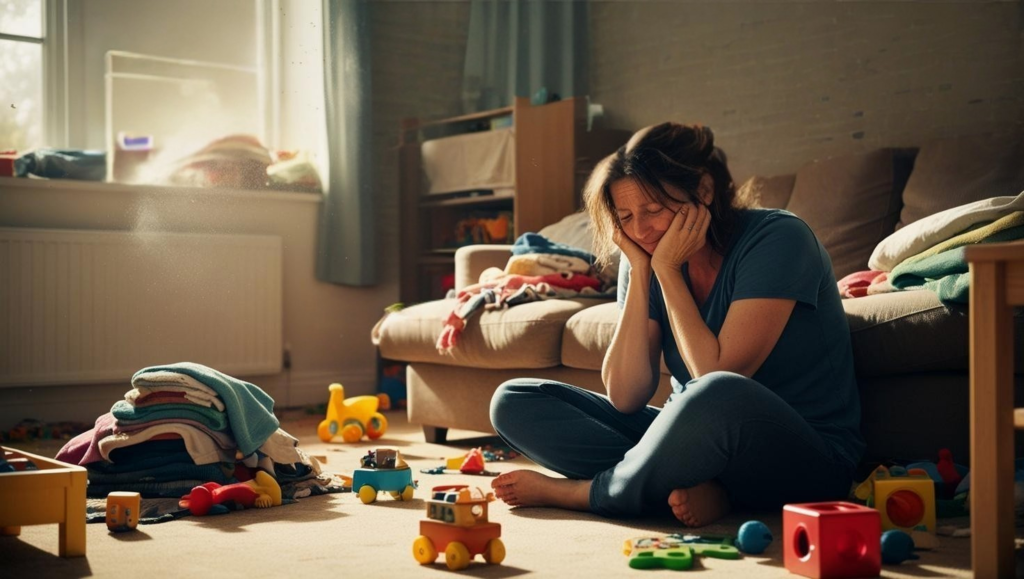When the Division of Household Labor Isn’t Equitable: The Impact on Your Time, Money, Well-being, and Relationships

If you’ve ever found yourself silently fuming while unloading the dishwasher for the third time that week, or felt that familiar knot of resentment as you pick up scattered socks on your way to a Zoom meeting, you’re not alone. The invisible and unpaid labor of running a household is a quiet crisis simmering in many homes. And when that labor isn’t divided equitably, it can have a profound impact—not just on your day-to-day, but on your time, money, well-being, and relationships.
This isn’t just about chores. It’s about emotional labor. Mental load. Time equity. Respect. Fairness. And ultimately, quality of life.
Let’s dig into what happens when household responsibilities aren’t shared equitably, and why shifting this balance is one of the most powerful ways to improve your life and your family’s future.
The Mental Load Is Real (And It’s Not Shared Equally)
Before we get into the impact, let’s define what we mean by “division of household labor.” We’re not just talking about cleaning toilets or folding laundry. Household labor includes:
- Managing schedules
- Shopping for groceries and household goods
- Planning meals and prepping food
- Keeping track of appointments, birthdays, and school activities
- Managing finances and paperwork
- Coordinating childcare and transportation
- Cleaning, laundry, pet care, maintenance, and emotional care-taking
When this list is managed by one partner or disproportionately shouldered by one, it creates an imbalance that often goes unnoticed until it boils over. And more often than not, the partner doing the majority of this work is a woman, especially in dual-income households with children.
Time: The Most Valuable Resource You’re Losing
Time is a finite resource, and inequitable household labor steals it from the person carrying the load. When you’re managing a home on top of your job, you’re working a “second shift” that your partner may not even realize exists.
If you’re constantly doing “just one more thing” while your partner relaxes or focuses on personal growth, career development, or rest, there’s a problem.
What This Looks Like in Real Life:
- You stay up late folding laundry while your partner watches TV.
- You’re the one reading school newsletters, replying to emails, and ordering snacks for the class party.
- You wake up early to get the kids ready while your partner sleeps in or goes for a run.
These small time losses add up to hours every week, and over time, that means missed opportunities to rest, to grow, to earn more, or just to breathe.
Money: The Hidden Cost of Doing It All
The unequal division of labor doesn’t just impact your time. It can directly or indirectly impact your earning potential and financial security.
Here’s how:
1. Reduced Career Opportunities
When one partner (often the mom) is constantly adjusting their work schedule to accommodate kid duties or home needs, they’re less likely to pursue promotions, travel for work, or even keep up with full-time hours. This contributes to the wage gap and long-term earning disparities.
2. Increased Reliance on Services
If the primary household manager is burnt out or unable to keep up, families often outsource help (think: cleaning services, takeout, daycare). While outsourcing can be a great strategy, it should be a shared decision, not a desperate coping mechanism for one overwhelmed partner.
3. Emotional Spending
Feeling resentful, depleted, or unseen? Many people cope with the burnout of household overload through impulse purchases or emotional spending. Ordering dinner, buying treats, or online shopping to soothe the stress.
The bottom line? When the load isn’t shared, you pay, either with your money or your future opportunities.
Well-being: Chronic Stress, Overwhelm, and Burnout
This part hits especially hard. Chronic overload: physical, emotional, and mental, has serious consequences for your mental and physical health.
The Emotional Toll:
- Feeling unseen or unappreciated leads to resentment.
- Constant multitasking leads to poor sleep and emotional exhaustion.
- The pressure to be “on top of everything” creates anxiety and self-doubt.
The Physical Toll:
- Less time for rest, movement, or healthy meals.
- Increased cortisol (stress hormone) levels that affect immune function, digestion, and energy.
- Greater risk of burnout and chronic illness.
You deserve a home that supports your well-being, not one that depletes it.
Relationships: The Slow Drip That Wears Love Down
No one wants to feel like they’re parenting their partner. And yet, that’s exactly how many women describe their dynamic when it comes to household responsibilities. When one partner becomes the default manager of everything, the emotional imbalance begins to damage the relationship.
Common Dynamics That Signal Trouble:
- “Weaponized incompetence”: One partner claims they “don’t know how” to do things or does them poorly so they’re never asked again.
- “Just tell me what to do”: Sounds helpful, but still places the burden of management on one person.
- Conflict avoidance: The partner doing less avoids conversations, causing even more emotional load for the one doing more.
These dynamics often lead to:
- Arguments and disconnection
- Loss of intimacy and attraction
- One partner feeling more like a roommate or employee than an equal
It’s not about assigning blame. It’s about restoring equity, empathy, and partnership.
So What Can You Do?
If you’re reading this and nodding (or crying, because…same), you may be wondering how to even begin changing this dynamic. Here’s the good news: it can shift. And it doesn’t require perfection. It requires communication, boundaries, and shared accountability.
1. Name It
Start by identifying all the tasks you do, especially the ones that are invisible or mental (like remembering to refill prescriptions, planning meals, or tracking school forms). Tools like the Fair Play Method by Eve Rodsky are fantastic for this.
2. Schedule a Calm, Non-Blaming Conversation
Don’t have the conversation while you’re in the middle of burnout mode. Choose a neutral moment and express what you’re feeling without assigning blame. Focus on how the current system is affecting your time, energy, and connection.
3. Reassign Tasks, Not Help
You’re not looking for someone to “help you” around the house. You’re looking to share ownership of the home. Choose tasks your partner can fully own from start to finish, including the thinking part.
4. Let Go of Control Where You Can
This is hard, especially for high-achieving moms who have a specific way they like things done. But releasing some control can create space for actual collaboration. It’s okay if things aren’t done your way, as long as they’re done.
5. Reevaluate Regularly
Life changes. So should your systems. Check in monthly or quarterly to reassess what’s working, what’s not, and what can shift.
How Rock Star Residential Services Can Help
At Rock Star Residential Services, we work with clients who are ready to take their time and power back. Our approach is ADHD-informed, inclusive, and compassionate. We’re not here to judge. We’re here to engineer your home so that it runs smoothly, sustainably, and in alignment with your values.
That means:
- Decluttering systems that stick
- Custom routines that reflect your real life
- Coaching around equitable household labor
- Support in implementing the Fair Play Method
- Ongoing accountability and virtual support
You don’t have to do it all. You just need the right support to stop being the default and start being a partner.
Final Thoughts
An unequal division of labor in your home isn’t just a minor annoyance. It’s a system that drains your energy, steals your time, limits your financial potential, harms your health, and chips away at your relationships.
But here’s the powerful part. You can change it. You can advocate for fairness. You can restructure the way your household operates. You can say yes to rest, time freedom, and a more peaceful rhythm.
And if you need help doing that, we’re here.
Let’s rebuild your home life to reflect your worth. You don’t have to carry it all. And you were never meant to.
